Um, How to Eliminate your Filler Words
This is a guest post from Kwesi Millington.
Kwesi is a public speaking, storytelling & confidence coach, teaching you to speak, share, serve and live with greater confidence. Check out his website at www.CommunicateToCreate.com . He shares some very practical tips on speaking and story.

When you speak, are your phrases littered with “um’s” and “ah’s”? Do filler words fill your speeches?
When I first started speaking, I HATED silence. I used to do anything to fill those silences. And when I didn’t know what to say next, I filled them with the non-word no-no’s that most people often use in conversation. The “Um’s”, “Ah’s”, “Likes” and “You knows”. It’s not that the audience did not understand my speeches when I used these words, but I appeared nervous, unprepared, and less professional.
I devoted myself to working on my delivery, and once I started to eliminate these filler words, I started to be told that my messages were more powerful, and that I was a pretty good speaker!
The thing is, the messages did not change to cause improvements; I literally TOOK AWAY words to make my speeches better, instead of adding them.
Let’s look at 5 strategies you can use starting now to become a, um, better speaker. These are easy to apply steps that will improve your communication and make you appear more confident. It’s as easy as one word: PAUSE.
P – Practice
Rehearse Your Speech. I have heard people say they can “wing it” or that they sound staged when they prepare beforehand. If that is you, fine, but from experience, complete practice leads to calm performances. People add fillers to make up for spaces in a speech that they are not prepared for. When you practice your speech, you get to know your material inside and out. This way, if you forget a part, you can pause and let it come back to you (because you have practised), or simply move on because lets face it, YOU are the only one who knows what you forgot anyways. How do you practice? See my article on the 5Ps of Perfect Practice for more.
A – Answer
When you ask your audience a rhetorical question to your audience (ie: Have you ever had a time when…?), take a moment to quickly answer the question in YOUR mind before continuing to speak. This does 2 things: firstly, it allows the audience to absorb your question, showing that you respect them and actually want them to think about it. Secondly, it forces you to pause, in a spot that you may have otherwise used fillers. The pause makes you look more polished and professional, and then you can continue speaking at your next sentence/thought.
U – Use Everyday as Practice
I once read of a question asked of high school students. They were asked to describe a situation in 2 ways: firstly, how they would tell a police officer the situation, and secondly how they would tell their friends. In the first instance, the verbiage was very proper, and in the second it was casual with fillers and broken English. Though I do not always believe in the following statement, I do believe it applies here: The Way You do ANYTHING, is the Way You do EVERYTHING. So from now on, get in the habit of NEVER using filler words, even when talking to your family and friends. Just like an athlete spends more time practising than in the game, most of your conversations are with people you know, and a very small percentage of your life’s speaking is on a stage, no matter how much you speak. So watch for filler words like um, ah, and like whenever you speak to ANYONE. Reduce then eliminate them in your daily life, and you will see that transfer to the stage.
S – Stop
When you speak, think of how you write. You add commas, semi-colons and periods in your writing. When you speak, deliberately pause where you would at these punctuation points. Many speakers are so focused on their next thought, they forget to let the last one sink in. Most people are visual learners, which means they form pictures in relation to what you say. Give them time to make those pictures, and to re-live your stories with you, by pausing at your punctuation points.
E – Enjoy Yourself
Finally, enjoy the process of speaking. You’ve practised, you know your material, and you have a message to share. Once you forget about being perfect and remembering everything that you want to say, you can enjoy your time on stage, SLOW down, and savour the moment. Don’t worry about the time or think about getting to your next point. Enjoy the NOW, and just deliver your speech one thought at a time!
At the end of the day, as Speaker Craig Valentine says, don’t look for perfection, look for connection!


